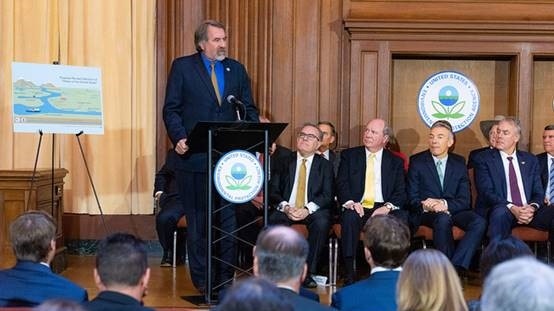December 14, 2018

It’s been a hard fight and at times few would have taken an even bet that the process would end in 2018, but this week Democrats and Republicans in both the House and the Senate passed a farm bill.
Passage of the Agriculture Improvement Act of 2018 required more than a few compromises, including a watering down of the House Ag Committee’s proposal to strengthen work requirements for able-bodied recipients of Supplemental Nutrition Assistance payments (SNAP).
The final votes approving the measure showed strong bi-partisan support, 87 to 13 to adopt the conference report in the Senate Tuesday and 369 to 47 in the House Wednesday.
Ag Committee leaders expressed gratitude, and likely sighs of relief, as the measure made the next to last hurdle before becoming law. Only President Trump’s signature is needed for the farm bill to become law.
It’s been a hard fight and at times few would have taken an even bet that the process would end in 2018, but this week Democrats and Republicans in both the House and the Senate passed a farm bill.
Passage of the Agriculture Improvement Act of 2018 required more than a few compromises, including a watering down of the House Ag Committee’s proposal to strengthen work requirements for able-bodied recipients of Supplemental Nutrition Assistance payments (SNAP).
The final votes approving the measure showed strong bi-partisan support, 87 to 13 to adopt the conference report in the Senate Tuesday and 369 to 47 in the House Wednesday.
Ag Committee leaders expressed gratitude, and likely sighs of relief, as the measure made the next to last hurdle before becoming law. Only President Trump’s signature is needed for the farm bill to become law.
“I am proud of the work we have done to fight for the hard-working farm and ranch families who feed and clothe this nation, to fight for better policy that strengthens the farm safety net and our rural communities, improves conservation initiatives, expands exports, and enhances the integrity of our nutrition programs,” said House Agricultural committee Chairman Mike Conaway (R-Texas).
“I’ve maintained from the beginning that this farm bill ought to be about standing up for America’s farm and ranch families who are going through some very hard times. “Farm country and rural America will be better off under this farm bill than they were before.”
“I am very happy to see my colleagues pass the 2018 Farm Bill,” said House Agriculture Committee Ranking Member Collin Peterson (D-Minn.). “As I said in my floor speech, rural America is facing so many challenges and this bill goes a long way toward providing needed certainty to farmers and ranchers.
“In particular, I am proud of the improvement it makes for our dairy farmers. The bill will provide expanded, affordable coverage options and more flexibility for dairy farmers.
“It also provides permanent mandatory funding for several of the programs that first got mandatory funding in the 2008 farm bill. These include the Local Food & Farmers Market Promotion Program, Value-Added Producer Grants, the BFRDP Program, Organic Research, and the Section 2501 Outreach Program. I encourage President Trump to sign the farm bill into law quickly.”
A needed safety net
U.S. Secretary of Agriculture Sonny Perdue says the farm bill provides a needed safety net to farmers, ranchers and rural communities that have been hard hit by declining prices and incomes cut in half over the last five years.
“The passage of the 2019 Farm Bill is good news because it provides a strong safety net for farmers and ranchers, who need the dependability and certainty this legislation affords,” Perdue said in a statement released shortly after the House passed the bill.
“This farm bill will help producers make decisions about the future, while also investing in important agricultural research and supporting trade programs to bolster exports. While I feel there were missed opportunities in forest management and in improving work requirements for certain SNAP recipients, this bill does include several helpful provisions and we will continue to build upon these through our authorities. I commend Congress for bringing the Farm Bill across the finish line and am encouraging President Trump to sign it.”
Rep. Doug LaMalfa (R-Calif.), a member of the House Agriculture Committee, issued the following statement after the House agreed to the Conference Report to Accompany H.R. 2, the Agriculture Improvement Act – also known as the Farm Bill.
LaMalfa said: “This Farm Bill is important for North State farmers, ranchers, and Ag producers who help feed and clothe the entire nation. The farm bill protects U.S. agricultural trade interests, makes significant improvements to rural broadband, and includes modest positive forestry reforms to help prevent catastrophic wildfires. The importance of this bipartisan legislation should not be understated – all Americans stand to benefit from it in some meaningful way. California is one of the largest producers of agriculture commodities in the world, and it’s our job in Congress to ensure our producers have the tools and protections in place to succeed, while working to protect and improve safety net programs for those in real need.”
Bill highlights
Highlights of H.R. 2:
Strengthens the safety net and provides more certainty and flexibility to America’s farmers.
Improves opportunities within conservation programs and shifts more resources into the Environmental Quality Incentives Program (EQIP).
Preserves the administration’s ability to strengthen SNAP work requirement waivers for able bodied adults without dependents (ABAWDs).
Improves program integrity and transparency within SNAP to reduce program abuses.
Expands resources to improve broadband deployment to rural areas.
Strengthens trade resources by streamlining market promotion initiatives under one umbrella and providing $470 million in additional funding.
Provides an increase of over $600 million in funding for research and education programs to improve innovation and productivity.
Increases resources to rural health projects to help Americans struggling with opioid addictions, including creating a Rural Health Liaison at USDA, and providing additional resources for distance learning and telemedicine grants.
Expands the guaranteed lending programs that bring private capital into rural America to allow rural communities to build and upgrade essential infrastructure such as hospitals, water systems, schools, and telecommunications.
Expands existing Good Neighbor Authority to include counties and Tribes to provide more localized forest management and timber removal.
Authorizes the USFS to implement a rights-of-way vegetation management pilot to conduct management activities near electivity infrastructure to reduce fuel load and decrease wildfire risk near power lines.
Continues funding for the Healthy Forest Reserve Program.
Reauthorizes and expanding the Community Wood Energy Program and the Timber Innovation Act.
Expands existing authorities to allow for cross-boundary projects to address wildfire risk on bordering non-federal lands.
Streamlines Resource Advisory Committee (RAC) appointment process to allow more effective local collaboration on management projects.
Reauthorizes the Biomass Crop Assistance program.
Westerners' opinions
The Congressional Western Caucus offered the following comments from some of its members:
Rep. Rick Crawford (AR): "For too long, rural America has been left behind as the rest of the nation moves forward. The farm bill is important for those engaged in production agriculture but also includes key provisions that address issues facing our rural communities, such as the opioid crisis, food deserts, and broadband access. This legislation is a resounding commitment from this Congress to rural constituencies that we recognize their needs and delivers on our promises to farmers and ranchers across America. The Farm Bill ensures our farmers and ranchers can continue to produce a reliable food and fiber supply, even amid uncertain economic times.”
Congressman Ralph Abraham (LA): “Agriculture is a critical part of the Louisiana economy, and our state’s farmers, ranchers and foresters deserve the stability and strong safety net the Farm Bill provides. This bill preserves crop insurance, adjusts for low commodity prices, strengthens dairy price protections, and preserves the family farm. This is a good bill, and that’s why farmers across the country are celebrating its passage.”
Chair Cathy McMorris Rodgers (WA): "Right now, our farmers need certainty. They need to know that the farm safety net is intact. That’s what this legislation does. The final 2018 Farm Bill includes my top three priorities: protecting crop insurance, supporting trade and market access programs, and increasing our commitment to agriculture research, like the great work being done at Washington State University. Our farmers are the greatest anti-poverty program and have done more to provide food security to the world than any government program. I was proud to support this legislation which supports them."
Chief Rules Officer Dan Newhouse (WA): "Farm Country has waited long enough, and today Congress delivered. As a third-generation Yakima Valley farmer, I know the farm bill plays an enormously important role in Central Washington’s agriculture economy by delivering a secure safety net for farmers and providing for research that keeps us on the cutting edge of global innovation. Farmers are struggling with a 50-percent drop in net farm income over the past five years, which is why market access programs and crop insurance are critical to providing certainty for agriculture producers. While some improvements were made, I would have preferred to include stronger provisions to improve nutrition programs and forestry management. Farmers needed action sooner rather than later. "
Rep. Don Bacon (NE): "One out of every four jobs in Nebraska is related to agriculture and the 2018 farm bill provides certainty not only to our farmers, ranchers and producers, but to so many other related industries in Nebraska. When our producers thrive, the processing, financial services and transportation industries on our state thrive meaning that more and more families in Nebraska are impacted by a successful farm bill."
Rep. Steve King (IA): "Iowa’s farmers want a farm bill that provides predictability, while also enhancing our ability to trade in foreign markets, and this bill accomplishes both of these goals. I am pleased that the final bill contains important provisions that I requested, including the ‘Genome to Phenome’ language that was a priority for Iowa State, vaccine bank language promoting the development and storage of GMO vaccines in the United States to deal with sudden outbreaks, and full funding for the Market Access Program which promotes foreign trade of our agricultural goods. This Farm Bill is a victory for our producers, it meets Rural America’s immediate need for greater trade, and it’s shameful that partisan politics prevented it from passing sooner."
Rep. Roger Marshall (KS): "Kansas farm bankruptcies are up six times since 2015. I’ve traveled thousands of miles in the past two years, touching base with farmers and agribusinesses across the state, and I am proud to report that the final bill strengthens our safety net, prioritizes trade promotion, fully protects crop insurance, improves the dairy program, invests in broadband and rural health, and so much more."
Rep. Ron Estes (KS): "This five-year farm bill provides much-needed certainty for Kansas farmers and ranchers through increased crop insurance programs and provides historic funding for rural broadband that will help farmers utilize new technology and get products to market faster. While the final bill didn’t include all the work requirement initiatives from the House-passed version, I’m glad the bill makes needed improvements to the SNAP program, including giving the Secretary of Agriculture flexibility to address work requirement waivers issued by states. As a strong advocate for work requirements like those that have worked in Kansas, I’ll continue working with the Trump administration to help families in need while getting people back to work."
About the Author(s)
You May Also Like






